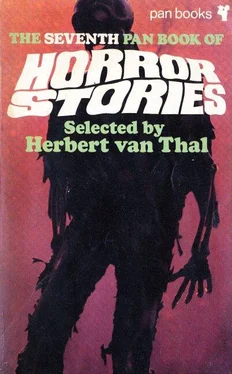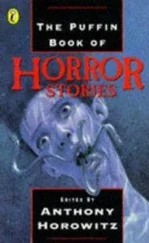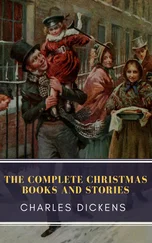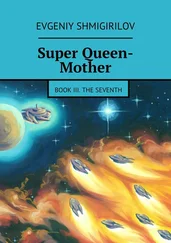Herbert van Thal - The Seventh Pan Book of Horror Stories
Здесь есть возможность читать онлайн «Herbert van Thal - The Seventh Pan Book of Horror Stories» весь текст электронной книги совершенно бесплатно (целиком полную версию без сокращений). В некоторых случаях можно слушать аудио, скачать через торрент в формате fb2 и присутствует краткое содержание. Город: London, Год выпуска: 1966, ISBN: 1966, Издательство: Pan Books ltd, Жанр: Ужасы и Мистика, Триллер, Маньяки, на английском языке. Описание произведения, (предисловие) а так же отзывы посетителей доступны на портале библиотеки ЛибКат.
- Название:The Seventh Pan Book of Horror Stories
- Автор:
- Издательство:Pan Books ltd
- Жанр:
- Год:1966
- Город:London
- ISBN:978-0330105552, 0330105558
- Рейтинг книги:4 / 5. Голосов: 1
-
Избранное:Добавить в избранное
- Отзывы:
-
Ваша оценка:
- 80
- 1
- 2
- 3
- 4
- 5
The Seventh Pan Book of Horror Stories: краткое содержание, описание и аннотация
Предлагаем к чтению аннотацию, описание, краткое содержание или предисловие (зависит от того, что написал сам автор книги «The Seventh Pan Book of Horror Stories»). Если вы не нашли необходимую информацию о книге — напишите в комментариях, мы постараемся отыскать её.
The Seventh Pan Book of Horror Stories — читать онлайн бесплатно полную книгу (весь текст) целиком
Ниже представлен текст книги, разбитый по страницам. Система сохранения места последней прочитанной страницы, позволяет с удобством читать онлайн бесплатно книгу «The Seventh Pan Book of Horror Stories», без необходимости каждый раз заново искать на чём Вы остановились. Поставьте закладку, и сможете в любой момент перейти на страницу, на которой закончили чтение.
Интервал:
Закладка:
The Seventh Pan Book of Horror Stories
Selected вy Herbert van Thal
Acknowledgements
Mr Charles Benfleet for the man who hated flies .
Mr R. Chetwynd-Hayes and London Authors for the thing .
Mr G. M. Glaskin and David Higham Associates Limited for the return .
Mr David Grant and London Authors for the bats .
Miss Dulcie Gray and London Authors for the fur brooch and dream house .
Mr Harry Harrison and Victor Gollancz Limited for the streets of ashkelon from Two Tales and Eight Tomorrows.
Miss Patricia Highsmith and A. M. Heath & Company Limited for the snail watcher .
The Executors of the late W. W. Jacobs and The Society of Authors for the monkey's paw .
Mr John D. Keefauver and London Authors for the last experiment and mareta .
Mrs Irene Morris for I'll never leave you — ever .
Mr William Sansom for a smell of fear ,
Mr William Sansom and The Hogarth Press for the little room from Something Terrible, Something Lovely.
Miss Rosemary Timperley and Harvey Unna Limited for street of the blind donkey .
Mr Martin Waddell and London Authors for cannibals and the old adam .
Miss Elizabeth Walter and The Harvill Press Limited for the island of regrets from Snowfall.
THE MAN WHO HATED FLIES
By Charles J. Benfleet
I first knew Hugo Latymer when he was a newly-appointed assistant housemaster and I, a mere ten years his junior, was in my final year at school. He took the Upper Sixth for Chemistry, but the main appeal of his classes was the way he could be side-tracked into talking about virtually anything else under the sun. Most of all I enjoyed the lengthy discussions on quasi-scientific subjects — telepathy, telekinesis, spiritualism and the like.
After I left we still used to see quite a lot of each other as I had taken a position with a firm in Horsham and so within easy reach of Cranleigh. Before long he ceased looking on me as Benfleet, C. J., but rather as Charles and we established a fairly regular routine whereby I dined with him once a year and returned his hospitality at similar intervals.
Hugo was in no sense a crank nor, indeed, am I (or so I firmly believe) but it seems to me wrong to accept modern science as the be-all and end-all of our understanding of the Universe. Many of the ideas that were scorned in their day have now become accepted and it is not so very long ago that men were put to death for believing that the Earth revolved around the Sun. No, we both believed that Man has only just begun to understand the great, universal Truth as a small child might take its first, tottering steps.
As the years went by Hugo became Housemaster and got married. I, too, married and with our greater responsibilities our meetings became less frequent. Dinners were supplanted by letters and occasional phone calls. Hugo's success as Housemaster earned him the offer of a Headmastership in India which, after some prompting by his wife, he accepted.
After the first year, when his new surroundings and experiences had prompted him to correspond quite frequently, our letters became fewer and farther between and, up to a short while ago, I had not heard from him for nearly a year.
Then, one Friday, an envelope with the familiar handwriting dropped through the letter-box. The letter bore, though, an English stamp and I tore it open eagerly.
'Dear Charles,' I read, 'You will be surprised to see that I am back once more in dear old England. I have managed to take the lease of a small cottage only a mile or two from the School. Though small it will be adequate for me now that my dear wife has passed away.
I feel only guilt that I agreed to go to India for it was there that Constance contracted the disease that was to prove fatal. The anguish her illness and my great sorrow since have conspired to prevent me from writing to you earlier.
There seemed no reason for me to stay on after Constance's death; indeed the bungalow held only sad memories for me, so I decided to return and live out my days close to the school where I found such happiness in the past.
'My sojourn abroad was, I now know, a mistake and has brought me not only great unhappiness but ill health too. Dirt and disease were only too prevalent out there. Financially I am fortunate to be reasonably independent so do not have to seek a position of any sort but, nevertheless, I would dearly love to restore my connections with the School be it only in some part-time or occasional capacity: which is all, I fear, that my present health would allow.
'But enough of my tribulations. Charles, I long to see you once again. Can you find the time to come to supper? Any day at all would be fine for me — just drop a line to let me know. The telephone is not yet installed so I cannot suggest ringing.
'As ever, Hugo.'
Anita and the children were enjoying a late holiday at her sister's home in Kingswear and would not be back until the Sunday evening so I thought I would take advantage of my temporary grass-widowerhood by calling to see Hugo on the morrow, Saturday. To avoid any possibility of a letter not being delivered in time, I sent a telegram advising him to expect me at about seven in the evening.
Saturday turned out to be dank and foggy. The local train that clanks wearily from Horsham to Cranleigh and on to Guildford was late but, even so, it was only 7.1' when I was knocking on the door of the gaunt and rather unlovely building that was Hugo's new home.
Seldom have I seen so great a change in any man. He seemed to have shrunk a full six inches and to have aged three times faster than the calendar would have conceded. His skin, too, had taken on an ashen, sickly hue.
I hid the shock I felt as best I could, allowed him to hang up my coat and followed him to a roaring fire which did much to dispel the chill from my bones and the oppressive gloom of the rather drably furnished room. The thin film of dust on the less accessible surfaces showed that much in the way of housekeeping was either beyond him or no longer of consequence.
The room served as both dining-room and drawing-room for a table was already laid out for supper. After a few minutes of rather stilted conversation, during which I extended my condolences for his wife's death, he excused himself and disappeared briefly, returning with two bowls of steaming hot soup.
On that chill night the soup was doubly welcome and served to melt the barrier that had formed between us after so long a separation. Over the cold meats that followed, and the apple pie, the clock turned back and we were once again the close friends that we had been in the years gone by.
A decanter of port had been standing on a side table. Hugo unstoppered it and passed it to me saying I have not lost my taste for this, you see, nor for a good cigar to accompany it!
'Now tell me, Charles, you must, from time to time, have pondered the mystery of death. We all of us do as the years weigh more heavily upon us. What do you think happens to us after death? To the essential "us", to the Ra of the ancient Egyptians, to the soul, if you prefer to call it that?'
'Well, that's quite a question to throw at me out of the blue.
I suppose that, basically, it seems both wrong and illogical that we should each exist for a mere drop in the ocean of time and then, suddenly, cease to exist, completely, utterly and for ever.
'I don't, personally, believe in reincarnation here on earth, but I feel that we must go on to another existence, somewhere. Not, of course, to a Heaven, all harps and clouds and long flowing robes, nor, indeed, to a Hell of smoke and eternal fires. If I have a conviction at all it is that the whole of life here, or on any other planet, is part of an experiment in some vast Laboratory and that we each possess a small spark, an infinitesimal subdivision, of the intellect of some Great Experimenter.
Читать дальшеИнтервал:
Закладка:
Похожие книги на «The Seventh Pan Book of Horror Stories»
Представляем Вашему вниманию похожие книги на «The Seventh Pan Book of Horror Stories» списком для выбора. Мы отобрали схожую по названию и смыслу литературу в надежде предоставить читателям больше вариантов отыскать новые, интересные, ещё непрочитанные произведения.
Обсуждение, отзывы о книге «The Seventh Pan Book of Horror Stories» и просто собственные мнения читателей. Оставьте ваши комментарии, напишите, что Вы думаете о произведении, его смысле или главных героях. Укажите что конкретно понравилось, а что нет, и почему Вы так считаете.












